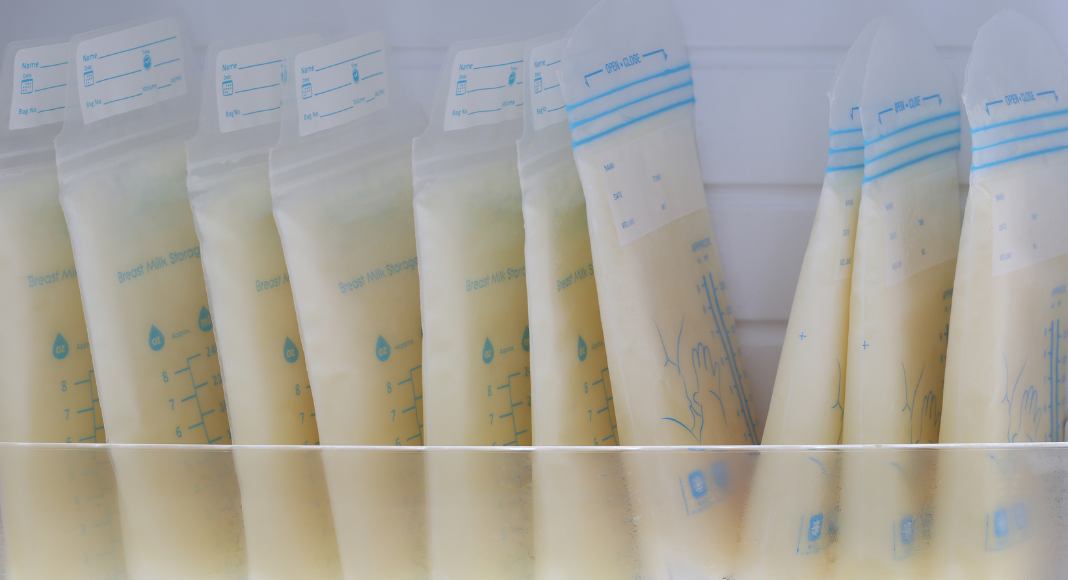Ever wonder about giving or receiving breast milk donations but never asked? I’m here to give some details on what still may seem like a taboo subject!
Whether you chose or didn’t choose to feed breast milk or formula, fed really is best! My intent is to educate on local resources, not to say breast milk is better than anything else. As long as baby and mom are happy and healthy, that’s all that matters!
I’ve exclusively pumped in two situations: for my son after he was born prematurely and spent some time in the nursery, and when I had an oversupply while nursing my daughter. I’ve used all of these resources below. I’m highlighting my real-life experience, mainly on the donating side.

Where to Donate Breast Milk
MMBSC is an organization through MUSC that pasteurizes breast milk for babies in the neonatal intensive care units (NICU) in SC hospitals at no cost. It’s accredited through a national milk bank organization. In response to recent formula shortages, MMBSC has started offering milk for purchase to mothers with babies at home, in order to cover the banking and pasteurizing costs they incur.
If you’re interested in donating to MMBSC, you have to complete a few screening procedures first. You start by completing a short interest form on their website, then a phone survey to answer questions about how you pump, what medications you take, and who your OB/GYN and pediatrician are. From there, they contact your doctor for some medical forms to make sure you would be a good candidate for donation.
Once they receive those forms, MMBSC orders your blood tests which you can complete at your convenience for no cost at a local lab office. The labs take a few days to result but once they do, you hear from MMBSC if you passed the screening tests or not. If you did, then you will receive a packet of information about donations in the mail.
They give you instructions on how to make donations, as well as information about your nearest depot location to drop off. Included are stickers to go with your donation, and a form to give with each donation describing the dates the milk is from, if you or your baby were sick at any time during that time frame, and if you have changed any medications during that time.
There are specific requirements for how to pump and store your milk that you have to adhere to. These procedures (washing parts after every pump, sterilizing parts once a day, freezing milk within 96 hours of pumping, and specific guidance about how long after drinking alcohol) may be more strict than you’re used to for your own baby’s use. But they are in place to protect the smallest and most fragile babies in the NICU that will be receiving your milk.
MMBSC has several depot locations to drop off your milk in Charleston, as well as across the state. Most are local hospitals with contact information for lactation consultants or nurses who can meet you for your breast milk donations. They do have replacement storage bags available and send you an email after every donation to let you know how many babies you were able to help feed with your specific donation.
From my experience, MMBSC takes a little more legwork in the beginning in order to donate (blood test, paperwork) but it’s really easy to set up a donation when my freezer fills up. I know I can stop by Roper St. Francis Hospital (my closest depot location) at any time for a very easy transaction on my schedule. Every time I drop off milk it’s like a celebration — the nurses come down to meet me at the front door (usually because I have my kids with me in the car) and are so thankful for the gift I’ve given. Their excitement and interest in how my babies and I are doing are such a welcome reminder of why I’m dropping off frozen milk. I love their communication and responsiveness, and it’s helpful to get replacement storage bags while I’m there.
Because of the specific requirements, MMBSC has regarding pumping procedures (washing, sterilizing, and drinking alcohol), I do keep my milk for donation separate from the milk I intend to keep for my baby. It requires a bit more organization than usual, but I just mark the milk I’ve followed MMBSC protocol for and keep it in a separate area of my freezer.

- Facebook Milk Share Groups: Human Milk for Human Babies – South Carolina HM4HB and Eats on Feets ~ South Carolina
These are local pages of groups that are active across the country and moderated by local moms in each state. These are places for moms to post offers or requests for breast milk based on location. To become a member of each group, you have to answer questions to adhere to the group rules and make posts based on those rules. Moderators typically share posts to generate traffic but the groups are not meant to match donations to requests, just to be a place to share for those in need and bring both parties together.
In my experience, these groups are great to use for one-time or recurring donations. Moderators are great about reassuring donors that they have the choice of who to donate to and when. It does take more work on the donor’s side to set up with the receiving party for when/where to give the milk, but you get to meet and interact with the family who will be using your milk which makes it more personal. There is a low barrier to entry to the pages so not much work to be eligible to donate.
These groups don’t have requirements for pumping and storing your milk, so you can follow your usual protocol for your own baby (i.e. if you use the “fridge hack” to not wash parts between pumps for your own baby). I’ve personally used these pages when I have frozen milk that I haven’t followed the protocol for MMBSC, but still would like to donate it.
Those discussions about protocols and dietary information for breast milk donations usually happen more between the offering and receiving parties individually after the post is made to make sure it’s a good pairing. Some receiving moms are looking for specific milk, like dairy-free for example.
These pages also exist across the country so I’ve used them when I was traveling and didn’t want to bring frozen milk home on the plane. Because of all the tourism in South Carolina, I see several posts on these pages about moms traveling to SC that are looking to offer the milk they pump here while they’re visiting.
These pages can be great for moms who are still pumping but just need a little more frozen supply to help get their own freezer stash built up. It’s also helpful for those who may be experiencing changes in their supply with going back to work, etc.
Hopefully, this article has shed some light on breast milk donations, whether you’re looking to offer or receive any in the Lowcountry!













